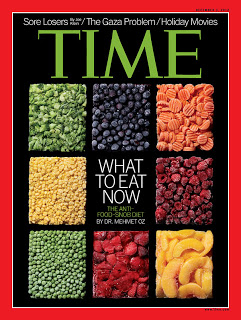Let’s start with a little scenario. At work, you’re up for a promotion. The promotion would be great; the extra money will make a difference. It’s something you’d really like to happen. Your current position is fine, it pays the bills but you’d love the opportunity to take on the new job. Announcements are made and you don’t get it. Initially you’re crushed but you find a way to spin it. “I didn’t really want the job, it would mean longer hours and more stress, I’m fine with my current position.” Let me translate, once you saw that you weren’t switching jobs, and receiving the associated benefits, you made a case for status quo…that doesn’t mean the promotion wouldn’t have been better.
The same thinking applies to food. Organic everything is not in everyone’s budget. That doesn’t mean (Stanford University) that organic/wild/grass-fed isn’t “worth” it. It’s up to nutritionists to assist individuals to make the best food choices with what they have to spend. Dr Oz, in a Time Magazine cover story “What to Eat Now: the anti-food-snob diet”, is telling Americans not only do you not need the “promotion” (or fresh produce or uncanned food) but also that your current position (supermarket staples) is just as good. I’m all for pointing out affordable, cost-effective food options but you don’t have to knock well-produced food. If we assume all foods are created equal you’re not getting the whole story.
Dr Oz would probably agree you can get heart surgery at most hospitals but “elite” institutions like Columbia University Medical Center will offer cutting edge techniques, the finest doctors and superior care. Would it make you a “health snob” to send a family member, assuming you had the opportunity, to a top-notch hospital? Or is all heart surgery, like spinach, is the same?
Throughout the article Dr Oz frequently uses “nutritionally speaking” but “speaks” only in the terms that support his message. He cites sodium and the macronutrients protein, carbs and fats in his explanation. Surely, doing his show day after day with nutrition experts (who are really well versed “nutritionally speaking”) Dr Oz knows of BPAs in most canned goods, pesticides in conventional produce, omega 3s and trans fats but maybe I’m being elitist in mentioning these details. In a discussion on meat, Oz condescends and says “there’s no question grass-fed, free-range, pasture-dwelling cows lead happier lives” but when he glosses over hormones, antibiotics, E. coli saying “if these things are important to you and you have the money to spend” go for it. Yes, hormones, antibiotics and E. coli are rather important, not a very “happy life” for me with my family consuming those.
Many of the examples cited are inconsistent. Nitrates in cold cuts are discouraged “don’t go there” but potential trans fats in PB are ignored. “Baked Pita Chips are great” really, “nutritionally speaking” what do they offer? Is fiber an “artisanal ingredient”? Dr Oz breaks down fats into the archaic saturates are bad and unsaturated are good but nutrition experts, even the non-snobby ones, know that there are good saturated fats (hello coconut and chocolate) and less healthy unsaturated fats so that’s not a great teaching tool.
I would let all these details go (not so good at letting things go but I would be less harsh) if the premise of the article was healthy, affordable food for all. However, polarizing specialty brands, farmer’s markets and “meat boutiques” on one side as snobby and unnecessary and suggesting supermarket, conventional food as affordable, accessible and every bit as good doesn’t tell a balanced tale. And I have to point out people would be better served using hard-earned money for organic dairy than the esoteric supplements Dr Oz pushes daily on his show. It would be nice if we could all eat high quality food, achieve professional success and go to the finest hospitals but we cannot. We need to make the best food choices we can, within our budgets, and that may involve some sacrifices in terms of health and taste. I may be a food snob but I’m an honest one.
Did you read the article? Do you think you need to knock the smaller and perhaps more expensive options to point out affordable ones? Do you think organic, grass-fed, fresh, hormone free food is “basically the same”?
Last day to enter/win Foodtrainers Favorite Gifts (I should say snobby gifts).


